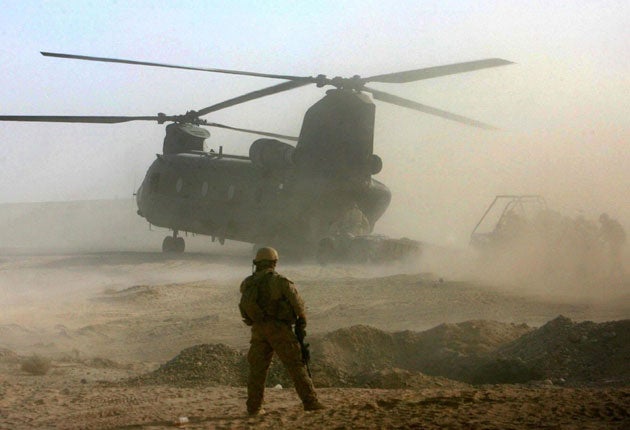UK in Afghanistan for decades, says our man in Washington
Diplomat's warning comes as MPs say Britain has lost sight of its original security objectives

Britain must concentrate all its efforts on the military campaign to conquer the Taliban as its attempts to achieve a wide-ranging "rescue" of Afghanistan have failed miserably, an influential committee of MPs warns today.
A report on the Afghan campaign from the Foreign Affairs Committee claims that British politicians have allowed "mission creep" to interfere with the original objectives set eight years ago, but they have still failed to pull off wider goals including stamping out the opium trade. Instead, the MPs insist, the UK should target its resources on "one priority, namely security" and allow the international community to spearhead the broader effort to rebuild Afghanistan.
The dismal verdict on the UK's all-round performance in Afghanistan came as Britain's most senior diplomat warned that Britain's involvement in the country will last for "decades". Sir Nigel Sheinwald, British ambassador to Washington, painted a bleak future for British forces in the week that the Panther's Claw operation in Helmand was declared a success. In an intervention laying out the longest official timetable yet seen for Britain's commitment to Afghanistan, he predicted that the tide would turn against the Taliban "over the next year or so" rather than in a matter of weeks.
"We're going to have a very long-term commitment to Afghanistan's future. This is not just one year," Sir Nigel said in an interview with The Boston Globe. "This is going to be for decades. We're going to help them get to a state which can they can ward off the return of the Taliban and al-Qa'ida. That's our strategic objective. We need to avoid the vacuum returning. And that's what this huge effort is about."
The committee report, Global Security: Afghanistan and Pakistan, followed a three-month inquiry which took evidence from more than 40 individuals and organisations, including the Foreign Secretary, David Miliband. It also concluded that the security situation in Afghanistan, particularly in the south where the majority of British troops are based, would remain "precarious" for some time.
But the report said there could be no question of the international community abandoning Afghanistan, and that the issue at stake must be how best the UK and its allies "can allocate responsibilities and share burdens so as to ensure that the country does not once again fall into the hands of those who seek to threaten the security of the UK and the West".
The committee chairman, Mike Gapes, said: "The UK has experienced mission creep from its initial goal of supporting the US in countering international terrorism, far into the realms of counter-insurgency, counter-narcotics, protection of human rights and state building. It is clear that despite the commendable efforts of the Foreign Office in adopting a broad-ranging, holistic approach to tackling narcotics in Afghanistan, success in that area depends on a range of factors which lie far beyond the control and resource of the UK alone."
The committee recommended that the lead international role on counter-narcotics should be transferred away from the UK, and that the Afghan government should be partnered at an international level by the United Nations and the Nato International Security Assistance Force (ISAF) in Afghanistan, which is better equipped to co-ordinate international efforts.
Although the committee backed the current "surge" which has claimed the lives of so many British troops, members fired a broadside against "caveats" used by Nato members to limit military involvement in Afghanistan.
The committee said a negotiated, Afghan-led political settlement with broad popular support represented the only realistic option for long-term security and stability in Afghanistan.
Mr Gapes added: "Bearing in mind that this is the first Nato deployment outside of Nato's 'area', this has now become a most critical and seminal moment for the future of the alliance. The failure of some Nato allies to ensure that the burden of international effort in Afghanistan is shared equitably has placed an unacceptable strain on a handful of countries."
William Hague, the Conservative spokesman on foreign affairs, seized on the report's findings to demand greater clarity from ministers about the UK's strategy in Afghanistan. He said: "This report should be a wake-up call to the Government. It confirms what we have been saying for months: Britain's objectives in Afghanistan should be realistic, tightly defined, and subject to regular formal assessment. The Prime Minister must make clear which minister has primary responsibility for our policy in Afghanistan and the Government should make quarterly reports to Parliament, covering Britain's objectives, the progress made in achieving them and the resources required."
Subscribe to Independent Premium to bookmark this article
Want to bookmark your favourite articles and stories to read or reference later? Start your Independent Premium subscription today.

Join our commenting forum
Join thought-provoking conversations, follow other Independent readers and see their replies